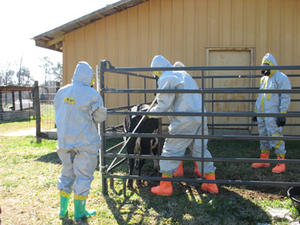AgroterrorismRisk of agroterrorism growing
The United States imports so much of its food and food ingredients from other countries, that terrorists have many more opportunities to harm Americans and damage the U.S. economy; a high FDA official said that increased U.S. attention to the issue and questions over whether hostile actors have the technical capacity to mount such an attack notwithstanding, the likelihood of being poisoned by intentionally contaminated food is growing

Agroterror training and drill // Source: ucdavis.edu
Globalization has its benefits, but it comes with risks, too. One example: The United States imports so much of its food and food ingredients from other countries, that terrorists have many more opportunities to harm Americans and damage the U.S. economy (see Mike McGraw’s Kansas City Star’s report).
The Kansas City KCTV-5 News reports that seven hundred people from twenty-five countries are meeting at the Hyatt Regency in downtown Kansas City to discuss topics dealing with the world’s food supply and how to keep it safe from farm to table. The conference began Wednesday and will end on Friday.
“A lot has occurred, nothing that has been intentional. We have not had an intentional contamination of food or within the agricultural industry. However the potential exists, and we want to encourage partnerships, public private partnerships, between government, law enforcement and the private industry,” FBI Special Agent Craig Watz said.
Jerry Jaax, associate vice president for research and compliance and Kansas State University veterinarian, offered an update on the plans to construct a Level-4 bio-containment facility in Manhattan, Kansas. The site will house researchers focusing on animal agriculture.
“Looking at agricultural pathogens, very much focused on protecting our agricultural infrastructure, cattle, sheep, agricultural animals,” Jaax said.
The new lab, to be opened in 2020, will replace the aging Plum Island, New York, facility. “There are a number of new bio containment facilities going up around the country that are focused on public health, more focused on human pathogens. This one is focused on agriculture. It’ll be run by Department of Homeland Security and USDA,” Jaax said. The conference runs through the end of this week.
Global Security Newswire quotes U.S. National Center for Food Protection and Defense deputy director Shaun Kennedy to say that “There are more firms registered with the Food and Drug Administration to supply food to the U.S. from outside the country than there are inside the country.”
McGraw notes that fears of tainted food led Congress to pass the Food Safety Modernization Act of 2011, which among other things seeks to establish heightened monitoring for potential issues in foreign and domestic food sources.
Kennedy said that increased U.S. attention to the issue and questions over whether hostile actors have the technical capacity to mount such an attack notwithstanding, the likelihood of being poisoned by intentionally contaminated food is growing.
